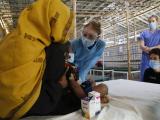Jan 5, 2010
Listeria findings prompt FDA action against cheese plant
The US Food and Drug Administration (FDA) yesterday said it would ask a federal court to halt production at a New Jersey cheese plant after inspectors repeatedly found unsanitary conditions along with cheese contaminated with Listeria monocytogenes. The court order would stop Quesos Mi Pueblito, based in Passaic, from producing and distributing products until its operators can show the plant complies with FDA requirements and makes cheese that is not contaminated with Listeria. The company makes and distributes a variety of soft, semi-soft, and hard Mexican cheeses that are marketed in six eastern states and the District of Columbia.
Jan 4 FDA press release
BARDA awards contract for new anthrax countermeasure
Elusys Therapeutics, based in Pine Brook, N.J., announced yesterday that it signed a contract with the Biomedical Advanced Research and Development Authority (BARDA) worth up to $143 million to complete the development of its monoclonal antibody, Anthim, to treat and prevent inhaled anthrax. The first year of the contract provides $16.8 million in funding, with possible additional support over the next 4 years. If the FDA approves Anthim, federal officials could purchase the drug for the Strategic National Stockpile (SNS) under Project Bioshield, a program designed to speed the development of medical countermeasures against diseases of bioterrorism. The FDA has already granted Anthim fast-track status and designated it as an orphan drug. At a recent BARDA stakeholders workshop, the company reported on studies in which 79% of nonhuman primates treated with a single intravenous dose at symptom onset survived a lethal anthrax spore
challenge. Another animal trial showed a 94% survival rate after a single dose was given after symptom onset.
Jan 4 Elusys Therapeutics press release
CDC logs decline in cruise-ship norovirus outbreaks
Norovirus outbreaks on international cruise ships sank to the lowest in nearly a decade last year, the US Centers for Disease Control and Prevention (CDC) reported recently. The CDC recorded 13 norovirus outbreaks in 2009, two fewer than in 2008. The number of reported norovirus outbreaks on cruise ships started rising dramatically in 2002, with 34 reported in 2006. Companies that participate in the CDC's vessel sanitation program are required to report the number of gastrointestinal illnesses before ships reach US ports and submit separate notifications when GI illness counts top 2% of the number of passengers and crew on board. To meet the CDC's outbreak definition, the boat must be sailing for 3 to 21 days, carry 100 or more passengers, and have 3% of the crew and passengers report diarrhea symptoms to the ship's medical staff.
CDC norovirus outbreak page
Study links chicken pox infections to vaccine refusal
In a report that may have a broad impact on childhood vaccination, researchers from Kaiser Permanente's Institute for Health Research in Denver found that children of parents who refused the varicella (chicken pox) vaccine were more likely to contract the disease. They published their findings in the January issue of Archives of Pediatrics & Adolescent Medicine. The group followed 133 children from one health plan who had chicken pox between 1998 and 2008, matching each case to four randomly selected children enrolled at the same time who did not get the disease. Of the group who got sick, 5% (7) had parents who had refused the vaccine, compared with 0.6% (3) of the 493 controls. The authors said the findings counter some parents' belief that unvaccinated children are not vulnerable to preventable diseases such as chicken pox.
Jan 2010 Archives of Pediatrics & Adolescent Medicine abstract
Jan
4 JAMA/Archives journals press release



















